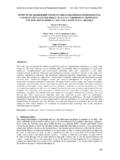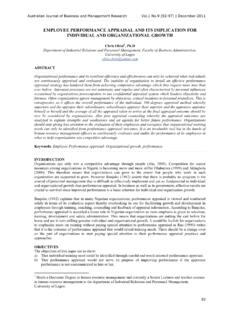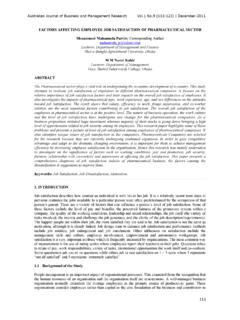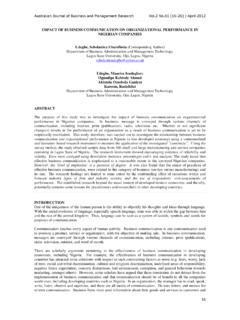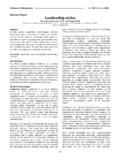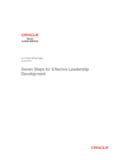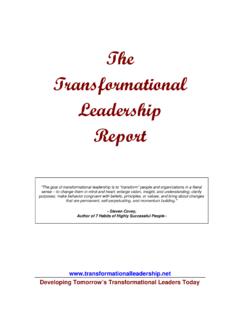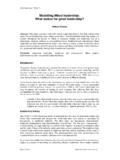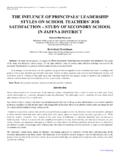Transcription of THE IMPACT OF PERSONALITY AND LEADERSHIP …
1 Australian Journal of Business and Management Research | May-2011 70 THE IMPACT OF PERSONALITY AND LEADERSHIP styles ON LEADING CHANGE CAPABILITY OF MALAYSIAN MANAGERS Hussein Alkahtani Department of Business Administration King Abdul Aziz University Jeddah, Saudi Arabia Abu-Jarad Department of Technology Management Universiti Malaysia Pahang (UMP) Lebuhraya Tun Razak, 26300 Kuantan, Pahang Darul Makmur, Tel:+609-549 2471 / Fax:+609-549 3199 Corresponding Author.
2 Sulaiman Department of Business Administration Kulliyyah of Economics and Management Sciences, International Islamic University Malaysia PO Box 10, 50728 Kuala Lumpur, Malaysia Davoud Nikbin School of Management, Universiti Sains Malaysia, 11800, Penang, Malaysia ABSTRACT This study was conducted to investigate the influence of the Big Five Dimensions of PERSONALITY of the Malaysian Managers and the LEADERSHIP styles these managers use on their leading change capabilities. Total sample of 105 managers was used in this study.
3 The results of this study revealed that the Malaysian managers tend to enjoy personalities that are conscious and open to experience. These managers tend to use consultative LEADERSHIP style. However, they use autocratic, democratic and some of them use laissez-fair, but the respondents of this study scored higher in consultative LEADERSHIP style. The results of the study showed that Extroversion PERSONALITY trait as well as involvement LEADERSHIP style were positively related with Leading Change.
4 Both Openness to Experience and Emotional Stability were significantly and positively correlated with Consultative LEADERSHIP Style that the managers use. Involvement LEADERSHIP Style was found to be significantly and positively correlated with Leading Change (R2=.38) In conclusion, this study showed a positively significant correlation between PERSONALITY of managers, their LEADERSHIP styles and their leading change capabilities. Keywords: Adopting New Procedures, Leading Change Capability, LEADERSHIP styles , PERSONALITY Traits INTRODUCTION A wise man once said that the only thing that remains constant is change.
5 In the age of budget cuts and greater responsibility, the society s needs keep changing. This issue keeps arising. The world has become faster-paced now more than before. Kotter (1996), in his work Leading Change , mentioned that the rate of change is not going to slow down anytime soon and he added that competition in most industries will probably speed up more in the next few decades. In change situations, both perception and attitude play very important roles. Both perception and attitude are related to PERSONALITY since the way people perceive things are different.
6 Since leaders are those who are Australian Journal of Business and Management Research | May-2011 71 responsible for leading change, we may wonder what kind of leaders they are. What kind of PERSONALITY they need to have in order to be capable of leading change. Indeed, each manager has a unique and special PERSONALITY where PERSONALITY is the set of unseen characteristics and the processes that underlie a relatively stable pattern of behavior in response to ideas, objects, or people in the environment.
7 Indeed, not all managers can be leaders; if we put a certain manger under certain circumstances and conditions he/she may bring about change in one organization; however, if we put another manager under the same conditions and circumstances, he/she may not necessarily bring about the same change. The manager s PERSONALITY has a significant influence on the way they think, feel and relate other people. PERSONALITY traits tend to be pretty stable in adulthood and lead people to act in certain preferred ways.
8 At work, the manager s PERSONALITY will sometimes help subordinates to carry out work roles effectively and at other times get in the way. Individuals with extravert traits find it easier to lead meetings, confront presentations and lead change. By contrast, people with low scores on the agreeableness scale may take time to acquire skills in areas such as team building coaching and mentoring because they are very self-sufficient and self-absorbed (Browne, 2002). People who have different backgrounds have different attitudes, values and norms.
9 These people do reflect their cultural heritages, which are, in fact, different. These differences result in different personalities of individuals that determine their actions and behaviors. Some people have strong personalities. They can influence others to act and do things. Others, who have certain type of PERSONALITY , can determine the way the organizations behave. Indeed, many researchers have conducted studies so as to understand the relationship between PERSONALITY and human behaviors. (Dole & Schroeder, 2001).
10 On the one hand, managers believe that maintenance of stability is a successful strategy for today s organizations. They believe that in order to have a successful organization, they should keep things settled and stable. To them, strict control is needed for organizations to function efficiently and effectively. Furthermore, they believe that workers should be told what to do, how to do it, when to do it, and who to do it with. On the other hand, leaders believe that change is the appropriate means of success.
